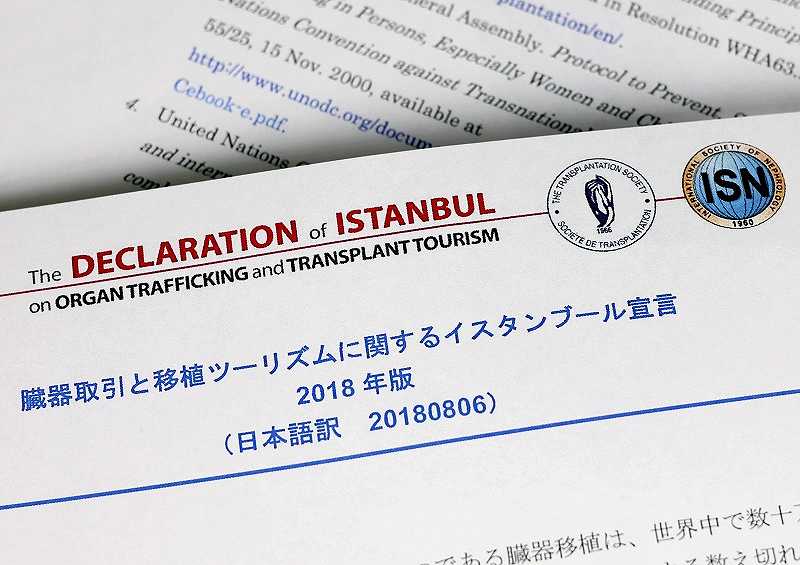
The latest 2018 edition of the Declaration of Istanbul calls for a ban and other measures against organ trafficking.
15:23 JST, December 25, 2022
Aiming to eradicate dubious organ transplants overseas, five medical associations plan to issue a joint statement as early as Tuesday, according to sources.
There has been no end to cases in which Japanese patients with kidney disease or other conditions have undergone organ transplants in developing countries and elsewhere where organ trafficking is suspected.
The exploitation of organs from disadvantaged persons has been strongly criticized across the globe, and the Japanese medical community intends to strengthen its response. The five societies are the Japan Society for Transplantation, the Japanese Society for Clinical Renal Transplantation, the Japanese Society of Internal Medicine, the Japanese Society of Nephrology and the Japanese Society for Dialysis Therapy.
It is highly unusual for multiple medical societies to issue a joint statement regarding overseas transplants.
The act of paying money to receive organ donations in developing countries is so-called transplant tourism, and the Declaration of Istanbul — the first edition of which was adopted in 2008 by the Transplantation Society, which takes global leadership on the issue — calls for a ban on such practices.
The Japan Society for Transplantation has already endorsed the declaration, and the four other societies above recently became endorsers.
In the envisaged joint statement, the five societies intend to support the declaration and express their determination not to be involved in organ exploitation and unfair transplantations overseas. The joint statement is intended to emphasize that the societies are united in their efforts to take measures against such activities seriously.
Specifically, the five societies plan to inform their member doctors and others of problems with overseas transplants that are suspected of being illegal. They will urge doctors and relevant others to explain legal and ethical issues and health risks to patients in order to discourage them from receiving overseas transplants.
Among major problems that led the societies to create the statement were those related to the Intractable Disease Patient Support Association, a nonprofit organization based in Tokyo, which were reported by The Yomiuri Shimbun in August this year.
Last December, a Japanese patient was found to have traveled to Kyrgyzstan to receive a kidney from a Ukrainian national with financial difficulties through the intermediation of this NPO. In return for the kidney, the NPO paid to a local coordinator about $15,000 in “donation fees.”
During an international gathering held in the Vatican in 2017, which was aimed at eradicating organ trafficking, it was reported that two Japanese nationals had bought kidneys in Vietnam the previous year, and that a person representing Japan was asked to explain the situation.
There are believed to be several intermediary organizations for overseas transplants in Japan, but the Organ Transplants Law does not specify any investigative authority, making it difficult to know the actual activities of such organizations.
Top Articles in Society
-

Producer Behind Pop Group XG Arrested for Cocaine Possession
-

Man Infected with Measles Reportedly Dined at Restaurant in Tokyo Station
-

Man Infected with Measles May Have Come in Contact with Many People in Tokyo, Went to Store, Restaurant Around When Symptoms Emerged
-

Woman with Measles Visited Hospital in Tokyo Multiple Times Before Being Diagnosed with Disease
-

Australian Woman Dies After Mishap on Ski Lift in Nagano Prefecture
JN ACCESS RANKING
-

Producer Behind Pop Group XG Arrested for Cocaine Possession
-

Japan PM Takaichi’s Cabinet Resigns en Masse
-

Man Infected with Measles Reportedly Dined at Restaurant in Tokyo Station
-

Israeli Ambassador to Japan Speaks about Japan’s Role in the Reconstruction of Gaza
-

Videos Plagiarized, Reposted with False Subtitles Claiming ‘Ryukyu Belongs to China’; Anti-China False Information Also Posted in Japan






















